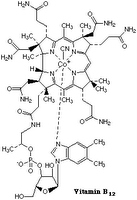 By Dr. Amy Joy Lanou
By Dr. Amy Joy LanouTo me vitamin B12 is one of the most interesting vitamins.
Marginal vitamin B12 deficiency is fairly common, largely not because of insufficient intake, but because it requires a complex set of circumstances to be absorbed. In order to be absorbed, one's stomach needs to be sufficiently acidic and the body needs to make a substance called intrinsic factor. In the presence of an acidic environment in the stomach, intrinsic factor complexes with vitamin B12. Intrinsic factor is required for vitamin B12 to be absorbed in the intestines. Acid is required for intrinsic factor and B12 to complex together. Elders and people with ulcers caused by bacterial overgrowth in the stomach often do not have sufficiently acidic environment for the vitamin B12 to complex with intrinsic factor. Also some individuals do not make enough intrinsic factor. In both of these cases, adding more B12 through the diet or supplements will not solve the problem. This is when B12 shots directly into the tissue become necessary (bypassing the absorption step). Individuals with bacterial overgrowth in their stomachs and duodenums can often be treated (and in most cases should be) when this happens, the stomach can often return to its normal acidic state, and B12 shots will not be necessary.
Frank deficiency is a real concern because it can cause irreversible nerve damage. Because vitamin B12 is needed for the breakdown of homocysteine (an independent risk factor for coronary heart disease), even marginal deficiency should be avoided.
Most omnivores do not need to worry about consuming enough vitamin B12 -- there is plenty in animal products to meet one's needs. And humans generally store up to about a five-year supply in the body which makes thinking about this vitamin more relaxed!
Vitamin B12 is made by bacteria in the guts of animal (including humans although we don't get much that way because we make it in the large bowel and its not absorbed well from there) and in most animals is then absorbed and incorporated into the tissues and secretions (meat, milk, etc.).
I do recommend fortified foods or supplements for vegans. In fact, it is really important for vegans to pay attention to getting a fairly regular supply of B12. Vegetarians consuming three daily servings of dairy products probably do not need to supplement, but it wouldn't hurt.
Good vegan sources include nutritional yeast, fortified cereals, fortified veggie meats, fortified soy and rice milks, and supplements. Any vitamin source containing B12 is fine. I prefer a high dose B12 only supplement that is used weekly rather than having to remember to take something daily. I like the sublingual or chewable versions because some absorption can happen through the mouth. The body will not absorb more than will be beneficial and it does store a fairly good supply so the periodic use of a supplement along with regular use of a fortified food source is more than sufficient.
-- Dr. Lanou is a Senior Nutrition Scientist for the Physicians Committee for Responsible Medicine and Assistant Professor of Health & Wellness University of North Carolina at Asheville. Article reprinted with her permission.





1 comment:
I am thoroughly convinced in this said post. I am currently searching for ways in which I could enhance my knowledge in this said topic you have posted here. It does help me a lot knowing that you have shared this information here freely. I love the way the people here interact and shared their opinions too. I would love to track your future posts pertaining to the said topic we are able to read.
Post a Comment